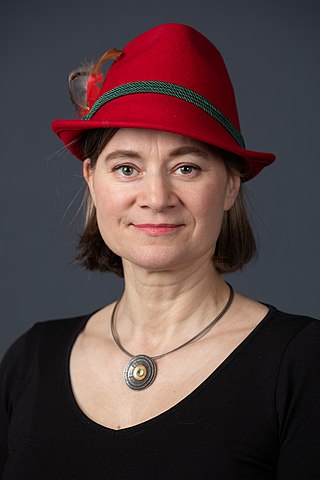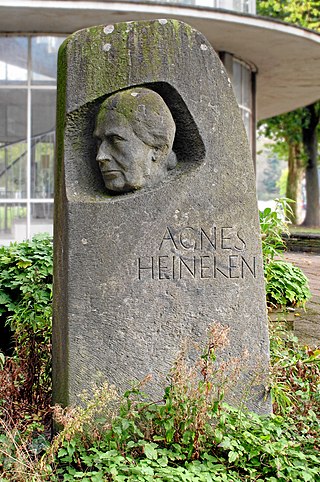Women's suffrage is the right of women to vote in elections. In the beginning of the 18th century, some people sought to change voting laws to allow women to vote. Liberal political parties would go on to grant women the right to vote, increasing the number of those parties' potential constituencies. National and international organizations formed to coordinate efforts towards women voting, especially the International Woman Suffrage Alliance.

The National-Democratic Party of Germany was an East German political party that served as a satellite party to the Socialist Unity Party of Germany (SED) from 1948 to 1989, representing former members of the Nazi Party, the Wehrmacht and middle classes. It should not be confused with the far-right National Democratic Party of Germany, which was a party in West Germany and continues as a minor non-governmental party in the modern united Germany.

The European Democratic Party, also known as the European Democrats, is a centrist European political party in favour of European integration. François Bayrou is the party's president.

Oskar Lafontaine is a German politician. He served as Minister-President of the state of Saarland from 1985 to 1998, and was federal leader of the Social Democratic Party (SPD) from 1995 to 1999. He was the lead candidate for the SPD in the 1990 German federal election, but lost by a wide margin. He served as Minister of Finance under Chancellor Gerhard Schröder after the SPD's victory in the 1998 federal election, but resigned from both the ministry and Bundestag less than six months later, positioning himself as a popular opponent of Schröder's policies in the tabloid press.

The Workers' and Peasants' Party was a political party in Liechtenstein. The party emerged from the trade union movement, as no workers had been elected in the 1949 elections. The party was founded as a delegates' assembly in 1953. It contested the February 1953 elections, it received 198 votes (6.9%) and but failed to win a seat due to the 18% electoral threshold. The party did not contest the June 1953 elections, and has not contested any since.

Helene Stöcker was a German feminist, pacifist and gender activist. She successfully campaigned to keep same sex relationships between women legal, but she was unsuccessful in her campaign to legalise abortion. She was a pacifist in Germany and joined the Deutsche Friedensgesellschaft. As war emerged, she fled to Norway. As Norway was invaded, she moved to Japan and emigrated to America in 1942.

The Left, commonly referred to as the Left Party, is a democratic socialist political party in Germany. The party was founded in 2007 as the result of the merger of the Party of Democratic Socialism (PDS) and Labour and Social Justice – The Electoral Alternative. Through the PDS, the party is the direct descendant of the Marxist–Leninist ruling party of former East Germany, that being the Socialist Unity Party of Germany (SED). Since 2022, The Left's co-chairpersons have been Janine Wissler and Martin Schirdewan. The party holds 28 seats out of 736 in the Bundestag, the federal legislature of Germany, having won 4.9% of votes cast in the 2021 German federal election. Its parliamentary group is the smallest of six in the Bundestag, and is headed by parliamentary co-leaders Heidi Reichinnek and Sören Pellmann.
National liberalism is a variant of liberalism, combining liberal policies and issues with elements of nationalism. Historically, national liberalism has also been used in the same meaning as conservative liberalism (right-liberalism).

The Pirate Party Germany, commonly known as Pirates, is a political party in Germany founded in September 2006 at c-base. It states general agreement with the Swedish Piratpartiet as a party of the information society; it is part of the international movement of pirate parties and a member of the Pirate Parties International.
Feminism in Germany as a modern movement began during the Wilhelmine period (1888–1918) with individual women and women's rights groups pressuring a range of traditional institutions, from universities to government, to open their doors to women. This movement culminated in women's suffrage in 1919. Later waves of feminist activists pushed to expand women's rights.
The League of Jewish Women in Germany was founded in 1904 by Bertha Pappenheim. Pappenheim led the JFB throughout the first twenty years of its existence, and remained active in it until her death in 1936. The JFB became increasingly popular through the 20th century. At its peak in 1928, the organization had 50,000 members from 34 local branches and 430 subsidiary groups. At the time, the JFB was Germany's third largest Jewish organization, with 15-20% of Jewish women in Germany becoming members.
The Free Voters of Bavaria is a conservative political party in Bavaria, considered centrist or centre-right. It has served as part of the governing coalition there since the 2018 state election under the leading Christian Social Union. The term "Free Voters" is also applied to the various independent voter groups common in Bavarian municipal and district elections. The name Free Voters of Bavaria applies to both the Bavarian State Association of Free and Independent Voters, an umbrella organization of Free Voter groups, as well as the Bavarian state chapter of the nationwide party Free Voters. The two groups exist simultaneously under the same name due to Bavarian election law not allowing umbrella organizations to run for office, thus the state party Free Voters of Bavaria was founded in 1997 in order to participate in the Bavarian state elections.

Ursula Männle is a German Social sciences academic and politician (CSU). She served between 1983 and 1994 as a member of the Bundestag. More recently, between 2000 and 2013, she was a member of the Bavarian Landtag, chairing an important parliamentary committee and, till 2009, chairing the women's working group in the Landtag.

Anke Domscheit-Berg is a German politician and activist. She has been a member of the Bundestag since 2017, when she was elected on the party list of The Left, without being a party member. She joined the party in 2021 following her nomination to the top female position on the party election list in the state of Brandenburg. Previously, she was a member of the Pirate Party Germany and the Greens. She is married to Daniel Domscheit-Berg. In 2010 she received the Berliner Frauenpreis.

Marie Lang was an Austrian feminist, theosophist and publisher. Born in 1858 in Vienna, Lang was raised in a liberal, upper-middle-class home. After divorcing her first husband in 1884, she married Edmund Lang and the two hosted an influential salon for politicians and intellectuals. Joining the women's movement toward the end of the 1880s, she quickly became an influential women's rights activist. In 1893, along with Auguste Fickert and Rosa Mayreder, she founded the Allgemeiner Österreichischer Frauenverein. In spite of provisions in Section 30 of the law governing associations, which prohibited women's political involvement, the three friends used their networks of influential politicians and intellectuals to press for legal changes in laws governing women and children's civil rights and in favor of women's suffrage. In 1898, she co-founded the women's journal Dokumente der Frauen, serving as its editor-in-chief until 1902.
Neues Frauenleben was a socialist feminist magazine which was published in Vienna, Austria, in the period 1902–1917. It was the official organ of the General Austrian Women’s Organization.

Agnes Heineken was a secondary school teacher who became a prominent women’s rights advocate. Deemed politically unreliable in 1933, she was deprived of her public appointments in the education sector, but after 1945 she returned to the public stage, taking a lead in restoring the education system. An obituary described her as a great organiser and an impressive personality, and a woman who, driven by her powerful sense of social responsibility, fought tirelessly for the education of girls and women, and for equal rights for women in society.

Yella Hertzka was an Austrian women's rights and peace activist, school director, and music business executive. She began working in women's humanitarian and social improvement projects in 1900. Co-founding the Neuer Wiener Frauenklub in 1903, she served as its president from 1909 to 1933. From 1904 she participated in the international women's rights movements, supporting women's suffrage and pacifism. In 1919, she attended the Zürich congress of the Women's International League for Peace and Freedom (WILPF). She was a co-founder of the Austrian section of the WILPF, organized its 1921 Vienna Congress, and attended every international WILPF congress held between 1919 and 1948. She worked to free prisoners of war after World War I and during World War II helped those wanting to emigrate or oppose the draft.












